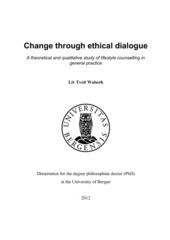| dc.description.abstract | Many patients meet the challenge of reordering fundamental priorities in life. The reordering can entail lifestyle changes for preventing disease, carrying out extensive treatment plans, or adapting to new dysfunctions in everyday life. Adaptive change may be of crucial importance for health and quality of life, and yet involve practical, emotional and social burdens that become insurmountable obstacles for the affected individual. Being central agents in the health service, general practitioners (GPs) are confronted with the challenge of finding ways to help their patients deal with difficult adaptations to risk, illness and medical interventions, through supportive interactions that integrate biomedical and personal issues. It seems, however, that patients do not always receive the help they need. The present study explores the theory and practice of doctor-patients dialogue, using lifestyle counselling as the field of study, a field where clinical work entails complex interactional challenges for doctors and patients. When patients are advised or perceive a need to change behaviour for medical reasons, deep-seated aspects of their value-systems are stirred. Lifestyle express and are rooted in people’s values and norms, in what is tacitly considered good, right and desirable in everyday life. Lifestyle change is thus a matter of individual ethics, often entailing dilemmas where medical goals may conflict with individual perceptions of a good life. The instrumental rationality of science, including biomedicine, does not contain the conceptual tools physicians need for dealing with the highly subjective, cultural, value-laden and dynamic aspects of human thought and behaviour that characterise and constitute health and illness. Patient-centred medicine (PCM) has evolved as a loosely knit body of theory to help clinicians integrate the biomedical perspective, anchored in disease theory, with the phenomenological patient perspective, rooted in subjective, relational experiences and individual values and goals. Patient-centred medicine advocates deliberative dialogue as a general approach that may reveal and clarify patients’ practical circumstances, values and norms, and thus allow doctor and patient to reach common ground - a shared understanding of what is at stake for an individual person in a given situation of illness or health risk. Starting from the claim that PCM is somewhat under-theorised and lacking in its detailed analysis of deliberative doctor-patient dialogue, the present project examines the relevance of philosopher Jürgen Habermas’s theory of communicative action (TCA) for lifestyle consultations in general practice. Habermas’s theory is based on the assumption that human rationality is defined by our ability to let our actions be guided by a consensus that is achieved through the use of language. It claims that a person is rational when arguments are reasoned by factual or empirically-based concerns, normative concerns, or subjective feelings. The latter two categories distinguish TCA from theories where only arguments referring to empirically verifiable facts qualify as rational (“instrumental rationality”). Habermas uses the concept lifeworld to designate the objective, social and subjective circumstances of individual existence that may serve as the basis for rational arguments and decisions. The project attempts to clarify how TCA may be medically relevant, and identify adjustments needed when the principles of TCA, developed for democratic deliberation, are introduced in a dyadic helping relationship characterised by asymmetry of knowledge and power. The overarching ambition is to operationalise elements of a deliberative theory in a way that may lead to improved clinical dialogues within a PCM framework. The thesis consists of one theoretical and two empirical papers. In GP consultations, we explored physician communication patterns that enhanced or obstructed the possibilities for patients to reach good, right and practicable decisions in lifestyle counselling. In interviews, patients’ needs and preferences in consultation dialogues were explored. The study suggests that Habermas’s theory of communicative action is highly relevant for dialogues in general practice. However, the demand that dialogue partners be on an equal footing poses a challenge in the context of medical practice. The asymmetric relationship between doctor and patient necessitates adjustments to the theory, allowing the doctor to take a leader’s responsibility, based on a mandate from the patient and a professional foundation of care, respect and willingness to learn from the patient. Through a mutually respectful dialogue where the doctor is open-minded and changes his or her mind as relevant arguments are brought forth, lifeworld issues, patient values and norms can be verbalised and understood in medical dialogue, and used as anchoring points for changes and adaptations. Whereas medical counselling based on disease theory and instrumental rationality may obstruct the clarif ication of patients’ subjective values and norms, and result in frustrated efforts to change individual priorities and behaviour, the present study suggests that Habermas’s theory, appropriately adjusted, can provide GPs with communicative tools that may give rise to an expanded form of patient autonomy and produce decisions which are good, right and practicable for the patient. | en_US |

